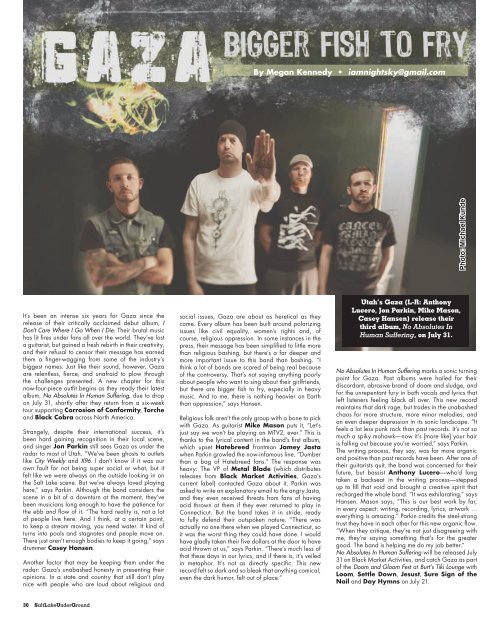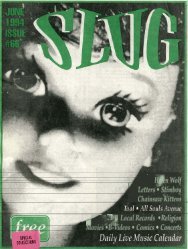Download issue as PDF - SLUG Magazine
Download issue as PDF - SLUG Magazine
Download issue as PDF - SLUG Magazine
Create successful ePaper yourself
Turn your PDF publications into a flip-book with our unique Google optimized e-Paper software.
It’s been an intense six years for Gaza since the<br />
rele<strong>as</strong>e of their critically acclaimed debut album, I<br />
Don’t Care Where I Go When I Die. Their brutal music<br />
h<strong>as</strong> lit fires under fans all over the world. They’ve lost<br />
a guitarist, but gained a fresh rebirth in their creativity,<br />
and their refusal to censor their message h<strong>as</strong> earned<br />
them a finger-wagging from some of the industry’s<br />
biggest names. Just like their sound, however, Gaza<br />
are relentless, fierce, and unafraid to plow through<br />
the challenges presented. A new chapter for this<br />
now-four-piece outfit begins <strong>as</strong> they ready their latest<br />
album, No Absolutes In Human Suffering, due to drop<br />
on July 31, shortly after they return from a six-week<br />
tour supporting Corrosion of Conformity, Torche<br />
and Black Cobra across North America.<br />
Strangely, despite their international success, it’s<br />
been hard gaining recognition in their local scene,<br />
and singer Jon Parkin still sees Gaza <strong>as</strong> under the<br />
radar to most of Utah. “We’ve been ghosts to outlets<br />
like City Weekly and X96. I don’t know if it w<strong>as</strong> our<br />
own fault for not being super social or what, but it<br />
felt like we were always on the outside looking in on<br />
the Salt Lake scene. But we’ve always loved playing<br />
here,” says Parkin. Although the band considers the<br />
scene in a bit of a downturn at the moment, they’ve<br />
been musicians long enough to have the patience for<br />
the ebb and flow of it. “The hard reality is, not a lot<br />
of people live here. And I think, at a certain point,<br />
to keep a stream moving, you need water. It kind of<br />
turns into pools and stagnates and people move on.<br />
There just aren’t enough bodies to keep it going,” says<br />
drummer C<strong>as</strong>ey Hansen.<br />
Another factor that may be keeping them under the<br />
radar: Gaza’s unab<strong>as</strong>hed honesty in presenting their<br />
opinions. In a state and country that still don’t play<br />
nice with people who are loud about religious and<br />
social <strong>issue</strong>s, Gaza are about <strong>as</strong> heretical <strong>as</strong> they<br />
come. Every album h<strong>as</strong> been built around polarizing<br />
<strong>issue</strong>s like civil equality, women’s rights and, of<br />
course, religious oppression. In some instances in the<br />
press, their message h<strong>as</strong> been simplified to little more<br />
than religious b<strong>as</strong>hing, but there’s a far deeper and<br />
more important <strong>issue</strong> to this band than b<strong>as</strong>hing. “I<br />
think a lot of bands are scared of being real because<br />
of the controversy. That’s not saying anything poorly<br />
about people who want to sing about their girlfriends,<br />
but there are bigger fish to fry, especially in heavy<br />
music. And to me, there is nothing heavier on Earth<br />
than oppression,” says Hansen.<br />
Religious folk aren’t the only group with a bone to pick<br />
with Gaza. As guitarist Mike M<strong>as</strong>on puts it, “Let’s<br />
just say we won’t be playing on MTV2, ever.” This is<br />
thanks to the lyrical content in the band’s first album,<br />
which upset Hatebreed frontman Jamey J<strong>as</strong>ta<br />
when Parkin growled the now-infamous line, “Dumber<br />
than a bag of Hatebreed fans.” The response w<strong>as</strong><br />
heavy: The VP of Metal Blade (which distributes<br />
rele<strong>as</strong>es from Black Market Activities, Gaza’s<br />
current label) contacted Gaza about it. Parkin w<strong>as</strong><br />
<strong>as</strong>ked to write an explanatory email to the angry J<strong>as</strong>ta,<br />
and they even received threats from fans of having<br />
acid thrown at them if they ever returned to play in<br />
Connecticut. But the band takes it in stride, ready<br />
to fully defend their outspoken nature. “There w<strong>as</strong><br />
actually no one there when we played Connecticut, so<br />
it w<strong>as</strong> the worst thing they could have done. I would<br />
have gladly taken their five dollars at the door to have<br />
acid thrown at us,” says Parkin. “There’s much less of<br />
that these days in our lyrics, and if there is, it’s veiled<br />
in metaphor. It’s not <strong>as</strong> directly specific. This new<br />
record felt so dark and so bleak that anything comical,<br />
even the dark humor, felt out of place.”<br />
By Megan Kennedy • iamnightsky@gmail.com<br />
Photo: Michael Kunde<br />
Utah’s Gaza (L-R: Anthony<br />
Lucero, Jon Parkin, Mike M<strong>as</strong>on,<br />
C<strong>as</strong>ey Hansen) rele<strong>as</strong>e their<br />
third album, No Absolutes In<br />
Human Suffering, on July 31.<br />
No Absolutes In Human Suffering marks a sonic turning<br />
point for Gaza. P<strong>as</strong>t albums were hailed for their<br />
discordant, abr<strong>as</strong>ive brand of doom and sludge, and<br />
for the unrepentant fury in both vocals and lyrics that<br />
left listeners feeling black all over. This new record<br />
maintains that dark rage, but trades in the unab<strong>as</strong>hed<br />
chaos for more structure, more minor melodies, and<br />
an even deeper depression in its sonic landscape. “It<br />
feels a lot less punk rock than p<strong>as</strong>t records. It’s not so<br />
much a spiky mohawk—now it’s [more like] your hair<br />
is falling out because you’re worried,” says Parkin.<br />
The writing process, they say, w<strong>as</strong> far more organic<br />
and positive than p<strong>as</strong>t records have been. After one of<br />
their guitarists quit, the band w<strong>as</strong> concerned for their<br />
future, but b<strong>as</strong>sist Anthony Lucero—who’d long<br />
taken a backseat in the writing process—stepped<br />
up to fill that void and brought a creative spirit that<br />
recharged the whole band. “It w<strong>as</strong> exhilarating,” says<br />
Hansen. M<strong>as</strong>on says, “This is our best work by far,<br />
in every <strong>as</strong>pect: writing, recording, lyrics, artwork …<br />
everything is amazing.” Parkin credits the steel-strong<br />
trust they have in each other for this new organic flow.<br />
“When they critique, they’re not just disagreeing with<br />
me, they’re saying something that’s for the greater<br />
good. The band is helping me do my job better.”<br />
No Absolutes In Human Suffering will be rele<strong>as</strong>ed July<br />
31 on Black Market Activities, and catch Gaza <strong>as</strong> part<br />
of the Doom and Gloom Fest at Burt’s Tiki Lounge with<br />
Loom, Settle Down, Jesust, Sure Sign of the<br />
Nail and Day Hymns on July 21.<br />
30 SaltLakeUnderGround slugmag.com 31

















